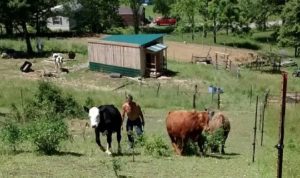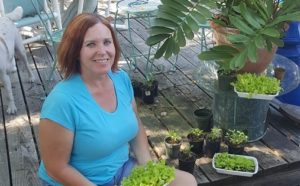
Start by reading a homesteader handbook that will help you become food independent. My choice would be a book called “Forgotten Lessons of Yesterday“, written by Theresa Crouse. I was surprised at the wide array of topics that she covered.
I’ve collaborated with Theresa Crouse via Survivopedia for several years now and, though we’ve emailed back and forth hundreds of times, we’d never met in person.
I finally met her and found out her story from zero to hero. Now I’m sharing her story it with you!
The interesting thing about Theresa is that she’s not your typical prepper. She lives a lifestyle that’s a motley collection of modern homesteading, common sense, and resiliency – exactly what her writing reflects.
She regularly covers topics ranging from growing medicinal plants to tanning hides. She is, indeed, resilient and independent, and the topics that she covered in the book reflected her diverse collection of skills.
We both agreed that, since I was going to be in the her state for a business conference, it would be a great time to finally meet in person.
Instead of meeting somewhere for lunch, Theresa invited me to meet her at her home so that I could meet her husband and see in person the gardening and homesteading techniques that she proudly shares with her readers.
Because her favorite articles tend to revolve around farming, I expected her to live on a farm, or at least a couple of acres. I was surprised to find that she currently resides in a suburb of Orlando, or, more correctly, a suburb of a suburb of Orlando.
When I pulled up, it looked like any other house on any other residential street, though I do have to say that the neighborhood had more trees than average and her yard had an abundance of tastefully arranged ornamental plants. When we went around to her enclosed backyard, however, it was as if we’d stepped right into the country. Well, as much as you can when you can still see rooftops.
She had several citrus trees and vertical gardens were arranged around nearly her entire fence line. Even the ornamental plants on the patio turned out to be edibles – chili peppers, squash, kale, and strawberries. There were four 10×10 raised beds with a path that wandered through them to a barbeque area, complete with a brick oven, that husband had built. As I expected, she and her husband were both relaxed and welcoming.
I didn’t go there for an interview, but after a great lunch on her patio – including a salad made with lettuce and vegetables from her garden and a fresh salsa that she’d just made that morning, it seemed that it would be a great time to ask her some questions about her book and her way of life in general to share with you.
Me: Looking at your book, “Forgotten Lessons of Yesterday“, it seems like you’re encouraging people to turn back to the days when people were healthier, by making our own food or living close to nature. In recent times, and in your writings, it’s like the pioneers are coming back to life and calling themselves homesteaders. Do you consider yourself a modern pioneer?
Theresa: I don’t know if I believe that “modern pioneer” is exactly what I’d call myself. I think I’m just a person who likes to live simply and be as independent as I can be. I guess, since most people have gotten away from living that way, you could call me a modern pioneer for encouraging it. I believe that, as our ancestors proved, the land will give us everything that we need, but we need to start taking care of it.
Me: Learning the old lessons of homesteading may seem pretty hard for somebody coming from an urban civilization. How hard is it to get the knowledge? How is that to you?
Theresa (laughing): It’s not hard, but there will be some bumps and lots of learning experiences. It’s funny you should mention that because we recently tried growing sweet potatoes – a crop we’d never grown before. Suffice it to say that there’s more to it than just sticking it in the ground. But now we know, and it was fun. I even wrote an article about it afterwards!
Seriously, though, the main thing is that you’re willing to learn. Just like anything else that you’re new at, there will be some mistakes, but you’ll learn from them. Trial and error. And you’ll always mistakes, just like you do in everything else.

Now we have 70 tomato plants and 40 pepper plants! I’ll never plant unknown seeds without sample germinating again! But, the upside is that we’re selling most of them, which will cover our gardening and canning costs for the entire year. Not all of my mistakes have been so cheap, though!
Me: Would it be possible for a person like you to change how he or she lives – to go back to being a consumerist? And could you?
Theresa: You know, I actually did for several years, though it never felt right to me. It was convenient to just buy everything from the store, but it didn’t take us long to realize that that just wasn’t the life for us.
As you know, I was raised on a farm, so I was used to eating everything – meat, veggies, milk, butter – fresh, without any chemicals. Once I started buying everything from the store, I noticed that the food just didn’t taste as good. The most noticeable things for me were tomatoes and milk. The tomatoes always seem to be mealy and flavorless, and the milk tastes like chemicals. Plus, there’s just nothing like fresh cream in your coffee. But still, it was convenient, so I pushed on.
Then John and I both started feeling just … yuck. We both gained weight (me more than him, of course!) and we had some other problems. I had brain fog and my skin was rough and splotchy. I was sick to my stomach a lot. Even though John was in the military and has always been pretty fit, his cholesterol shot up.
I started paying attention to what we were actually putting in our bodies, and knew that we had to get away from all of that garbage and start eating chemical free, taste-good food again. And once we did, we never looked back.
It was like slipping on a favorite pair of slippers – I was just comfortable again. And our health problems went away. I guess you can take the girl off the farm, but you can’t take the farm out of the girl. It’s a core part of who I am and I can’t just NOT think and live that way.
Me: Reading your book feels very much like a journey that the reader takes along with you, in a very personal area of knowledge. Why is this book so personal?
Theresa: The easiest answer is that it’s personal because I’m sharing a core part of myself. In my heart, this is who I am. It’s not just how I was raised.
The more complicated reason that it probably feels more personal is that writing it brought back a lot of memories. I mean, I know how to do all of the things in my book, and so I just do them without investing much thought into it. When I actually sat down and explained how to do it, it made me think back to canning with my mom, or hunting with my grandfather. I realized that I’m not just teaching methods, I’m sharing my heritage.
Me: What would you tell to somebody who would like to turn to self-sufficiency but he or she doesn’t have the courage or doesn’t know where to start?
Theresa: I’d tell them that you start at the same spot that you start any new task – at the beginning. Start small. Don’t plan to be completely self-sufficient by next fall! Pick something that you’d like to do – for me, a big part of being self-reliant is growing my own food. If that’s the case, then maybe start out with some herbs, or if you’ve already grown herbs, start some vegetable seeds.
Buy books for beginners – for instance, mine breaks every task into small steps because I was writing on the assumption that the reader has never done it before. Find books like that. Do searches on the internet. Go through websites – Survivopedia is great, and that’s not just because I’m biased. There are several other sites out there, too. Just suck up the knowledge. There’s nothing like hands-on experience, but if you read about it, you’re already a step ahead because you’re not going in blind.
Me: I know we’ve been talking for a while now, and I need to get back, but for my last question, let’s address those folks who don’t live on a farm, or even in a single-family house. I’m looking around your yard and see that you’ve been really creative with a relatively small amount of space. What would you say to other people who want to be self-sufficient but don’t have much space?
Theresa: I’d say what my grandmother used to say – can’t never could. In other words, don’t find reasons why you can’t become self-sufficient; find ways that you can. Everybody has room on a counter for some herbs. That will save you quite a few bucks right there. You don’t need a ton of space to become at least partially resilient. You just have to find them.
There are other ways to go about it than just growing food, too. I didn’t write about this in the book, but it’s something that mirrors how I was raised – yard sales. They’re a great way to find good deals, get away from the big stores, learn how to barter, and how to upcycle/reuse just about anything. I watch Flea Market Flip and was hooked from the first episode. I’ve been trying my hand at that, in addition to finding cool clothes and stuff that I need. It’s fun!
Being self-sufficient shouldn’t be painful – don’t t make it something that you do because you have to. There’s a real sense of pride that accompanies eating food that you’ve grown or setting your glass on a coffee table that you’ve made or repurposed with your own hands.
Find the joy in being able to take care of yourself, even if it’s in small ways. Because, trust me, once you start, you won’t want to stop!
This interview has been taken by Alec Deacon for Survivopedia.
from Survivopedia
Don't forget to visit the store and pick up some gear at The COR Outfitters. How prepared are you for emergencies?
#SurvivalFirestarter #SurvivalBugOutBackpack #PrepperSurvivalPack #SHTFGear #SHTFBag


No comments:
Post a Comment